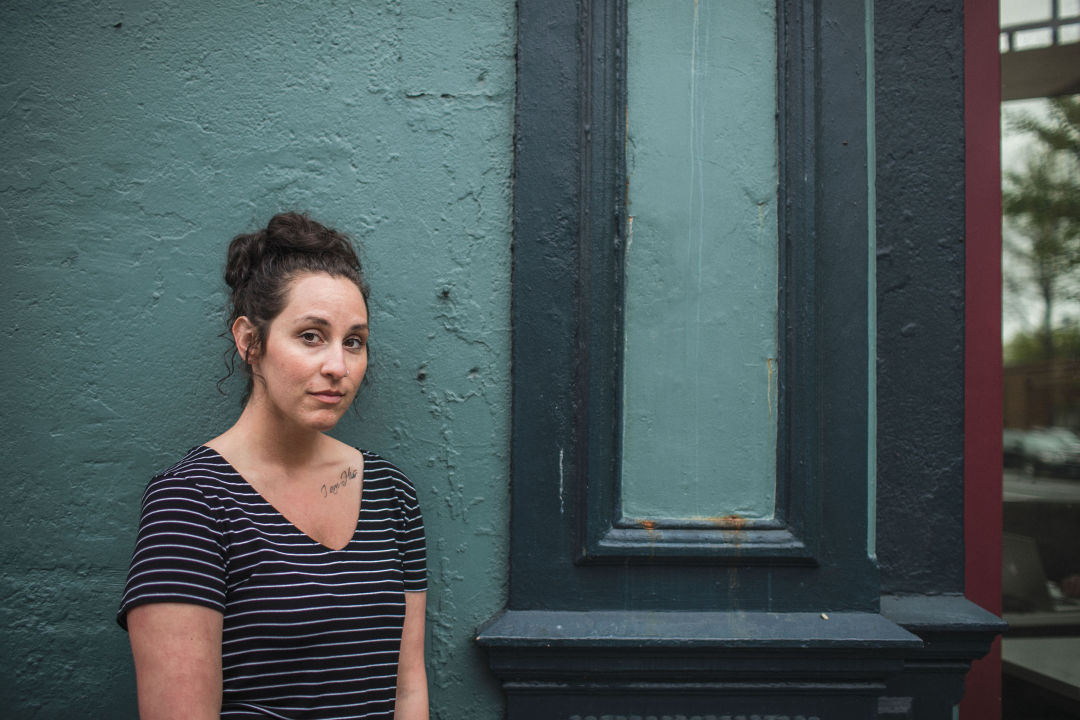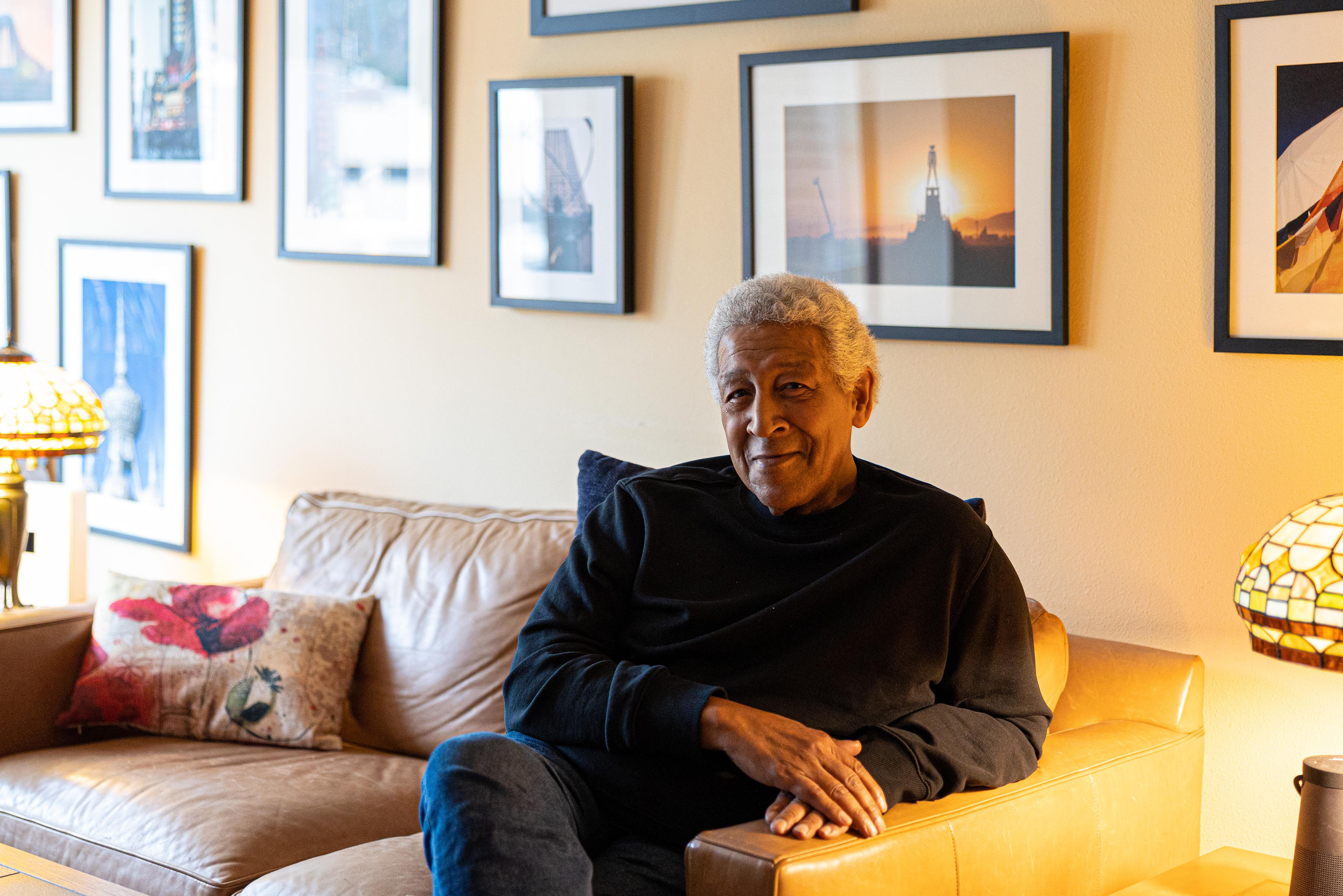One Woman’s Story of Living on Oregon’s Streets

Formerly homeless Oregonian Corrine Penning now works as a coordinated access case manager at local homeless-to-housing nonprofit Transition Projects.
Image: Celeste Noche
At age 24, Corrine Penning was living on Oregon’s streets, in condemned houses, in the woods, in public parks. She was driven there by drugs and domestic abuse, a combination that pushes thousands of women across the country into homelessness every year. In the span of eight months, the West Linn native—the daughter of a waste disposal company manager and a stay-at-home mom—sold heroin, stole electronics, ran from one physically abusive relationship to the next, and landed in jail multiple times. Now 30, she’s sober, saving for a house with her fiancé, and working as a coordinated access case manager at local homeless-to-housing nonprofit Transition Projects—helping other women who experienced many of the things she once did. This is her story.
I came from a really good family, really supportive. As a freshman in high school, I was prescribed Valium because I had to have a medical procedure. I remember taking it and feeling the effects and thinking, ‘I want to feel like this for the rest of my life.’ At first it was opiates, [then] alcohol, marijuana, cocaine, and it just kind of built from there. Heroin came rather quickly. And that was born out of not being able to get the opiate pills I had been taking.
I quickly learned how to hide it. From age 14 to 24, I was an extremely high-functioning addict. I worked, I was going to school part-time to be a drug and alcohol counselor. I had a child at 18, and took care of him and supported my partner. I had my own house [in Southern Oregon]; my own car. I was really good at presenting this picture of what people wanted to see.
My family found out, and sent me to treatment. (My parents took guardianship of my son—it’s the best thing they’ve ever done for me.) But I came out of treatment with a new boyfriend who introduced me to meth. It quickly spiraled out of control.
One morning [my boyfriend] tried to kill my cat because he was mad at me, and we got in a knock-down, drag-out fight. Our friends sat and watched, and no one helped me. When he got distracted, I took off in my pajamas and I hitchhiked into town. I ran into some homeless people. They were like, ‘Hey, are you OK there? You’re barefoot, you’re in a tank top and shorts, what’s going on?’ And they took me in. There was one woman, she only had the clothes on her back and the clothes in her backpack, and she didn’t hesitate to give [them to] me.
I stayed in a park the first night and [then] in a condemned house with a group of homeless people. The power was off, there was no running water, there was a lot of drug [and] criminal activity, but they kept me safe. They gave me a room that locked.
Homelessness is its own culture [with] its own rules and family dynamics. The bonds are there. Some of the best people I’ve ever met were those people in that first week when [my ex] was actively chasing me and I was hiding and terrified. They just took care of me with no questions asked.
I quickly learned how to shoplift. I became what they call “the booster.” People would say, ‘Hey, I need this.’ And I would provide it in exchange for cash or drugs, money, food, a place to stay, whatever I needed.
After the last time I went to jail [for unauthorized use of a motor vehicle], my parents [got] me this place to stay. I didn’t make it to my court date, and there was a warrant out for my arrest. My parents found me passed out. I’d been up for, like, seven or 10 days on a meth binge. They couldn’t wake me up, and there was a gun next to my bed. So they called 911, and the police showed up. I got to sit on my porch in handcuffs, detoxing from meth and heroin, while cops brought drugs and stolen property out of my house. [They] said, ‘Your daughter is gonna to go to prison.’ When I hugged my dad, he was trying not to cry. He said, ‘When you get out, I hope I get my daughter back.’ That hit me like a ton of bricks.
In the week before my arrest, I had sold heroin to a six-months-pregnant woman and didn’t care. I had sold heroin to a 17-year-old boy who had never tried it before, and I didn’t care. All these things are hitting me as I’m sobering up and stuck in the cell with nothing to do but think about the things that I’ve done. Then I had to call my son, who was 8 at the time. He said, “If you’re going to keep doing this, I don’t want to talk to you anymore.” That was the bottom.
I got connected with some amazing women in my county jail who showed me that I had worth outside of a man and outside of being able to find drugs or booze—they loved me just for me. And every time I went back to jail, they were there. I still talk to one of them four years later. She’s in prison now, but we still talk on a daily basis.
I did a little over a year in the residential [treatment] program [in Portland]—it was the first place I felt safe in years. Within two months of going to treatment my son came and visited me. I wasn’t willing to give that up again.
I began volunteering [with homeless services]: going out to homeless camps, taking basic supplies, and building relationships. To be able to give that, to go out to these camps and connect with these women, building the trust and being able to say, ‘I’ve been exactly where you are and you can do this. There is help.’ It was just amazing. That’s where I found my passion. And that’s how I found Transition Projects.
People on the streets are absolutely no different than [housed] people. They just don’t have the walls to hide behind. They want community and they want safety and they want family and they want love. We’re all the same—it’s just whether we’re on display or not.




